Key takeaways:
- Reparations politics involves addressing historical injustices and requires systemic change, not just financial compensation.
- Local meetups foster community, empower individual voices, and drive meaningful change through shared personal experiences.
- Planning successful gatherings involves clear objectives, inclusive outreach, and creating safe spaces for open dialogue.
- Ongoing discussions and resource sharing are crucial for maintaining momentum and expanding dialogue beyond formal settings.

Understanding reparations politics
Reparations politics is a complex yet deeply significant issue that delves into the historical injustices faced by marginalized communities. I remember attending a local meeting where a survivor shared their family history of trauma. It really struck me how these personal stories highlight the urgent need for acknowledgment and restitution; it made the abstract idea of reparations feel very real.
One of the most critical aspects of reparations politics is the ongoing debate about what forms reparations should take. Some advocate for direct payments, while others emphasize investments in education and community resources. Reflecting on these discussions, I often wonder: what would real reconciliation look like? It’s a question that challenges us to envision a future where justice is truly served.
As I’ve navigated these conversations with various groups, I’ve seen that understanding reparations is not merely about financial compensation; it involves addressing systemic inequalities and fostering genuine dialogue. It’s a process of healing that requires us to confront uncomfortable truths and engage with one another empathetically. This exploration can be emotionally charged, but it’s essential for fostering a more equitable society.
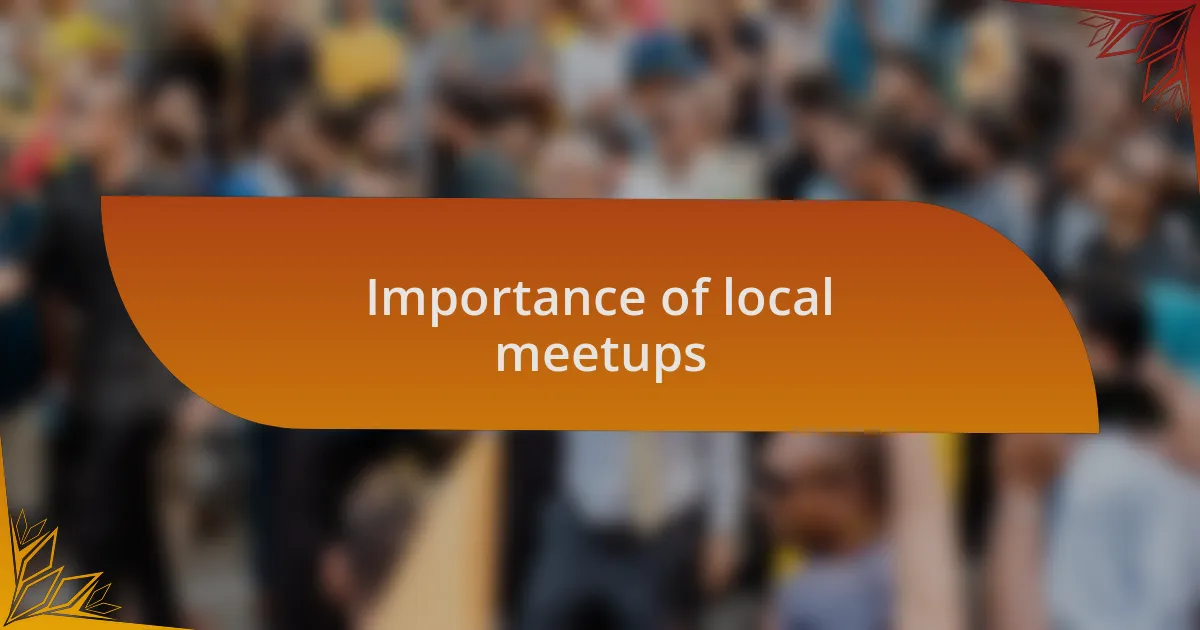
Importance of local meetups
Participating in local meetups has profoundly shaped my understanding of reparations politics. At one gathering, I watched as individuals from diverse backgrounds shared their experiences, creating an atmosphere of solidarity that was palpable. This connection made me realize that local meetups are not just about discussing policies; they are essential for building community and fostering relationships that can drive meaningful change.
These gatherings serve as vital spaces for education and awareness. I recall how a facilitator broke down complex reparations concepts into relatable terms, making it accessible for everyone present. It reminded me of the power of local dialogue—when we share knowledge freely, we empower each other to advocate for justice more effectively.
Engaging in local meetups also prompts reflection on our responsibilities within the reparations movement. I often find myself asking: how can we hold our community accountable? This question lingers with me as I contemplate the role of grassroots activism. Building a local network strengthens our collective voice, reminding us that we are not alone in this journey toward reconciliation and healing.
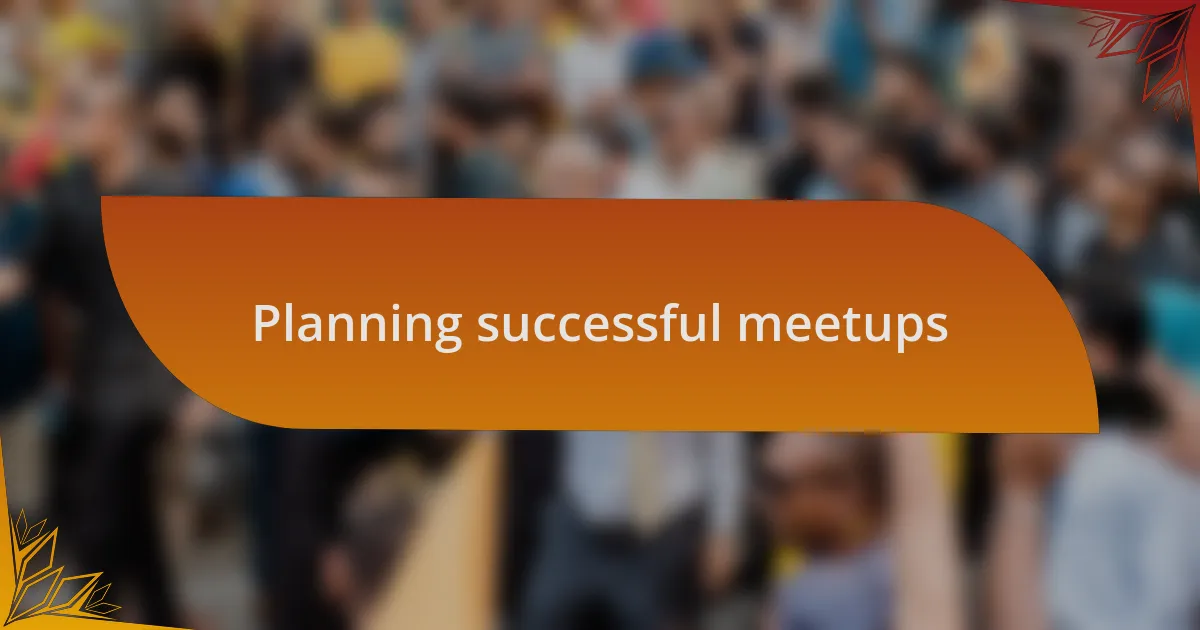
Planning successful meetups
When planning successful meetups, I’ve learned that clarity is key. It’s essential to define the purpose of each gathering, whether it’s to share knowledge, strategize action, or create a sense of community. One time, I organized a meetup with simply a vague outline, and the outcome felt scattered. In contrast, when I set clear objectives, conversations flowed more naturally, and participants felt more engaged.
I also believe that the location plays a vital role in the success of meetups. I prefer venues that are comfortable and familiar, as they foster a more relaxed atmosphere. During one of my favorite meetups, we gathered in a local community center where people felt a sense of belonging. The ambiance encouraged open dialogue, leading to richer discussions about our shared goals in reparations politics.
Another factor I’ve noticed is the importance of inclusivity in outreach. When I put effort into reaching out to marginalized voices and ensuring they felt invited, the energy of the meetup transformed. I often think, how can we truly drive change if we don’t include those most affected? Each voice adds a unique perspective, and embracing this diversity enriches our collective understanding and sparks innovative solutions.
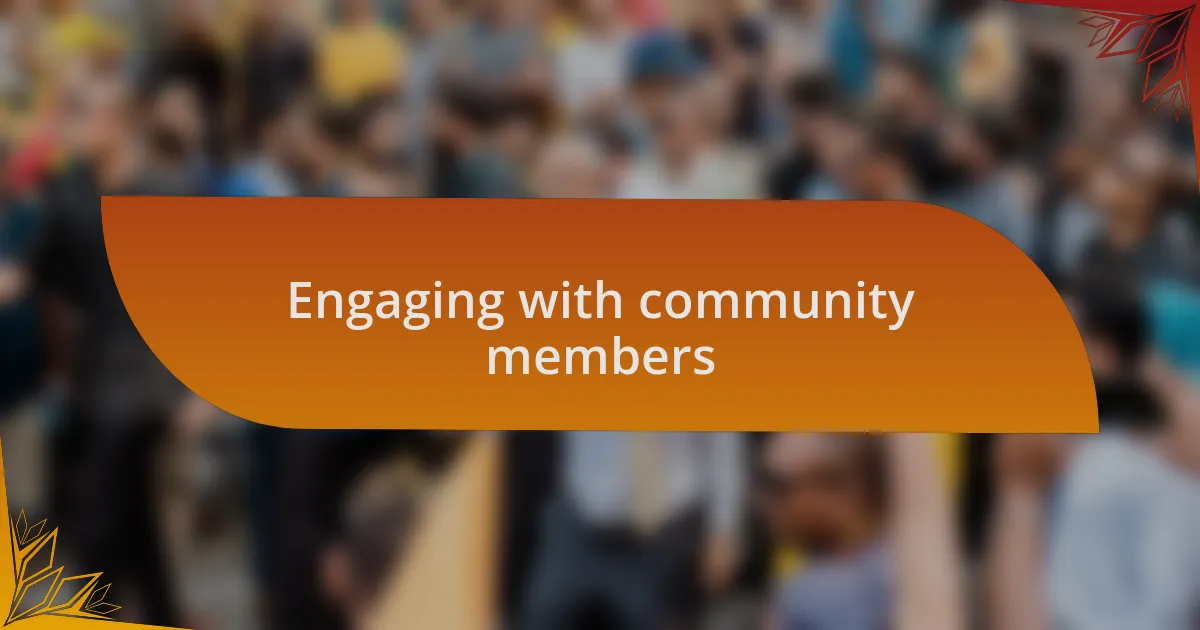
Engaging with community members
Engaging with community members is often where the magic truly happens. I remember a particular session where I asked participants to share their stories about reparations. The vulnerability and honesty displayed were transformative; it created a space where everyone felt connected and valued. Have you ever noticed how powerful storytelling can be in uniting voices around a shared cause?
Building rapport with attendees is essential for fostering a sense of trust. One time, after a meetup, I took the time to follow up with individuals who expressed concerns about the reparations movement. This small gesture not only made them feel heard, but it also opened the door for deeper conversations in future gatherings. Trust is a two-way street; the more effort we put into engaging one-on-one, the more invested our community members become.
Lastly, facilitating open discussions can ignite passion and activism within the group. During one meetup, we used a round-table format that encouraged everyone to speak without interruption. I watched in awe as participants who typically hesitated suddenly began sharing their perspectives. It was clear: when people feel safe and empowered to contribute, their engagement skyrockets, and the discussions flow more freely. How do you create that space for engagement in your groups? It’s something to consider as we strive for meaningful connections.
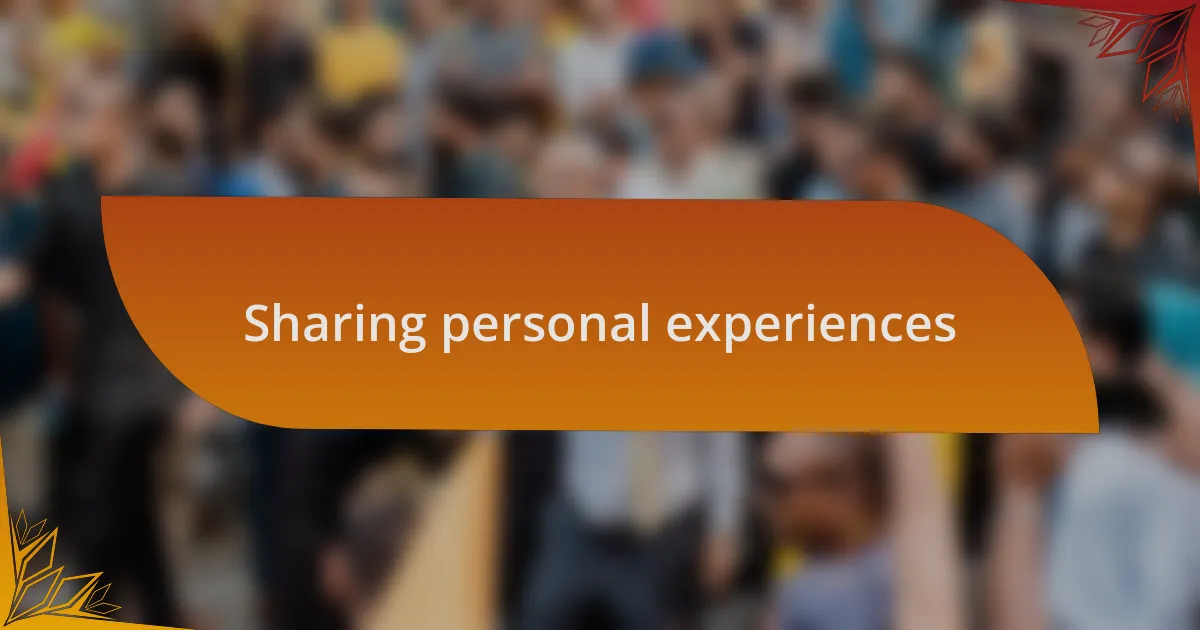
Sharing personal experiences
Sharing personal experiences can serve as a powerful catalyst for understanding and empathy. I recall a moment during one meetup when a member shared her family’s history regarding reparations. Her heartfelt recounting brought tears to my eyes; it was a poignant reminder of the real impact these discussions can have. Have you ever found yourself moved by someone’s story in a similar way?
The rawness of personal narratives often reveals the complexities behind policies. For instance, another participant spoke about their struggles with intergenerational trauma tied to reparations debates. Listening to them opened my eyes to aspects of reparations that I had never considered. How do we truly address these layers when forming a community around such vital issues? It’s essential to bridge those personal stories with our collective activism.
Moreover, sharing experiences creates a bond that can transform a group dynamic. One time, after several meetups where vulnerability was embraced, there was a palpable shift in our group. People who had once sat quietly began offering their insights, leading to richer, more thought-provoking dialogues. Isn’t it incredible how a simple act of sharing can cultivate that level of engagement? This is the heart of meaningful conversations on reparations.
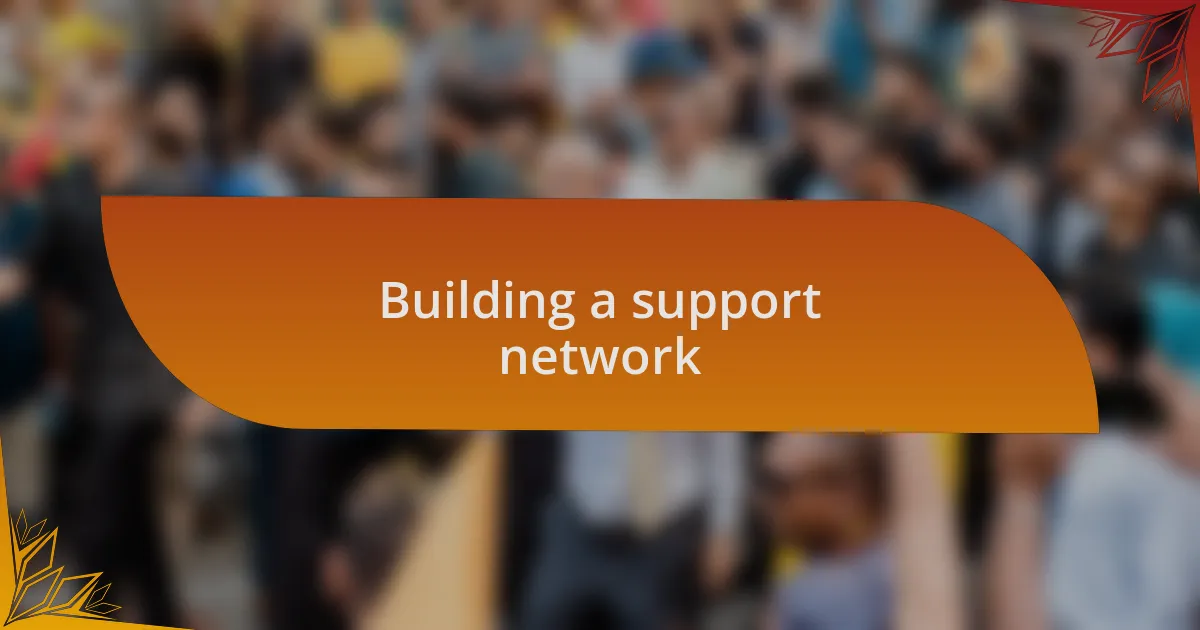
Building a support network
Building a support network is essential in creating a space where everyone feels valued and heard. I remember the first time I reached out to someone after a meetup, feeling nervous yet hopeful. I asked if they would like to grab coffee to discuss ideas further. That one conversation sparked a deeper connection, and we found ourselves brainstorming solutions to foster more inclusive discussions around reparations. Have you ever experienced that moment of realizing a simple invitation can lead to lasting partnerships?
Establishing meaningful relationships within your support network can greatly enhance the collective impact of your efforts. At one point, we organized a small brainstorming session where each attendee brought a friend. The variety of perspectives not only enriched our dialogue but also expanded our reach. It struck me how our network naturally grew from a handful of interactions into a vibrant community. Have you thought about how inviting others can multiply the energy and enthusiasm for a cause?
It’s in these moments of connection where trust begins to blossom, laying the foundation for collaborative activism. I once witnessed a fellow organizer share their fears about approaching local representatives for support. As the group rallied around them, offering encouragement and strategies, I realized that this network wasn’t just about sharing knowledge; it was about uplifting each other, turning individual uncertainty into collective strength. How powerful is it to know you’re not alone in your pursuits?
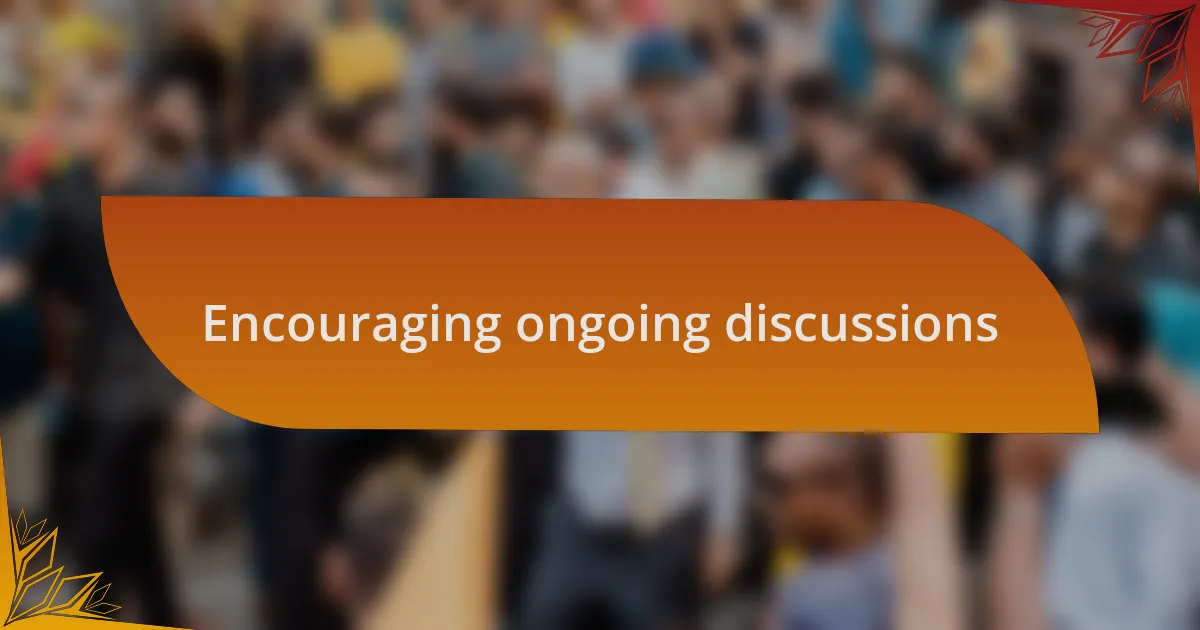
Encouraging ongoing discussions
Encouraging ongoing discussions is crucial for keeping the momentum alive in our advocacy for reparations. I remember during one of our meetups when we decided to set a weekly discussion thread online. Each week, someone would share a thought-provoking article or question, and the conversation would flow organically. I was amazed at how even a simple post could ignite passionate debates and draw in voices from varied backgrounds, invigorating our network.
One evening, I found myself chatting with a participant who expressed frustration over the lack of ongoing dialogue after our initial gatherings. This led us to create a series of follow-up meetings centered around specific themes, making it easier for people to re-engage. I realized that by providing a structured yet open platform, we allowed discussions to evolve naturally. It was inspiring to watch how our group transformed into a hub of continuous learning and exchange of ideas.
Moreover, sharing resources has become a powerful way to keep conversations alive. After each meetup, I would send out a curated list of articles and documentaries related to reparations. One member shared how these materials sparked inspired discussions at their own dinner table. It struck me that while we focus on formal meetings, the heart of our movement lies in informal dialogues that extend beyond traditional boundaries. Have you considered what role the informal conversations in your life play in shaping your understanding of complex issues?